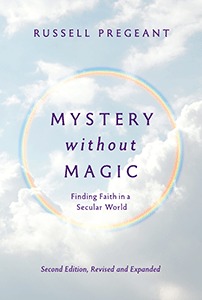Jesus Revolution
Mystery Without Magic
A Review
Frank A. Mills
January 1, 2023

Finding Faith in a Secular World
Russell Pregeant
Mystery without Magic: Finding Faith in a Secular World, Russell Pregeant, second edition, revised and expanded. Process Century Press (Anoko, MN), 2022, 241 pages, including study questions and notes, ISBN: 9781940447551.
I love language. Russell has a way with it. His style is informative, while laid back. When Russell writes it is Pastor Russell writing, not the academic that he is also.
As I say, I love language – the theory of language was part of my undergraduate minor –and it was his chapter, “Rethinking Religious Language,” that I kept coming back to. I have made mark after mark, underline after underline in the book, and I’m someone who hates to write in a book.
But you can’t read “Rethinking Religious Language” without also reading “Understanding Religious Tradition: Putting Words in Perspective.” Here, to illustrate how religious tradition works, Russell adds several diagrams.
One could mull over these two chapters for hours, if not days. But in a real sense these chapters are but an introduction for Russell’s premise: We can find faith in a secular world. And this faith is a faith divorced from the “magical thinking” of traditional Christianity, yet it is a faith that loses none of the mystery of faith.
In Mystery without Magic, Russell brings us to a way that engages the religious language of the past, a way “distance us from naïve belief (p.47).” In removing the “magic” religious language become the language of imagination. This language of imagination, Russell believes, opens wide the possibilities of the mysteries of faith and provides for a deep, rich meaning within religious symbols and traditions. It lifts our zest for life, our caring about justice and humanity, and our wondering about meaning from the secular world to the holy, without losing our ability to positively interact with the secular. Simply put, it provides is a faith that works within a secular world.
Russell writes, as he lays out the basic approach of the next 160 or so pages: “I will approach the imaginative language of religion as such—that is, as language that excite the imagination and invites us to take a step on the bridge (p. 47).” The bridge, a metaphor that carries through the book, is that bridge between a naïve faith full of magic and a faith that speaks to the secular age while retaining her mystery. A bridge that Russell invites the reader to cross.
In fact, Russell takes us step by step across that bridge. And like a good pastor, he’s there to help us, to guide us, across and along the journey that waits on the other side.
As one who seeks to base my Christian life, in part, on Celtic Christianity, I thoroughly enjoyed the chapter on journeys and destinations, of being seekers and finders (Chapter 4). Especially significant is the section on Jesus as a wanderer (p.55).
As Russell so aptly puts it, it is the breaking away that begins the journey. In true Celtic fashion, Russell reminds us that the destination is not certain, nor it the venture guaranteed. So why begin? Because if we allow religious language to become imaginative, we are drawn seeking out a better way, something that gives meaning to life in the midst of secularity. The Celtic Christian monks called this, “finding one’s places of resurrection.” “Places,” in the plural. It is toward these places that Russell in Mystery without Magic guide us. He doesn’t tell us what they are, but he helps with giving us practical guidance as we move along the journey.
We are alerted to the heights and depths that will come our way as we venture over the bridge and take up the journey. Through the words of the book, we explore the role of both “faith” and “grace.” We learn to interpret experience and tinker with religious traditions in a way that makes sense of our journey with the naivety of the “magical theology” of some Christian traditions. We learn to become who we are as people of faith, no matter the “otherness barriers” that are set in our way (Chapter 12). Barriers, that according to Russell, are really bridges.
Russell admits that the journey will not necessarily be an easy one. He writes, “There are many harsh realities with which we must deal.
In the last chapter, Russell returns to the imaginative language of the scriptures and the hope that they offer us as journey on, or as Russell puts it, “Keep on Keeping on.”
In the Epilogue, Russell reminds us that both language and tradition are fluid and that will be times that we may need to return to the bridge and reimagine the language of scripture in new imaginative ways and reframe religious traditions to speak to an everchanging secular culture. But still, it remains a journey of imagination and mystery.

Mystery without Magic offers study questions for each of the thirteen chapters and the epilogue. These questions would work well with book study group, and it is a good book for a group study. Better yet, I think looking at each chapter’s questions before moving on to the next chapter will help us better understand what Russell is suggesting.

Russell Pregeant, A Methodist Minister, now retired, was Professor of Religion and Philosophy at Curry College (Milton, MA) and Visiting Professor in New Testament at Andover Newton Theological School. He is the author of several books, Reading the Bible for All the Wrong Reasons (2011) and Encounter with the New Testament (2009). Russell and his wife live in Wells, Maine.
© Frank A. Mills, 1997-2024



